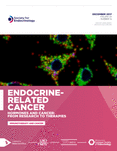Grace Rock's consent
- Department of Internal Medicine and High-Risk Cancer Program, University of Texas Southwestern Medical Center, 5323 Harry Hines Blvd, Dallas, Texas 75390-8852, USA
- (Correspondence should be addressed to T S Ross; Email: theo.ross{at}utsouthwestern.edu)
New England leaves changed along with young lives during a fateful September. Grace Rock was 35 years old when she was diagnosed with breast cancer in 1991. As the shock waned, she and her family agreed to participate in a study of cancer-causing mutations conducted by her doctor's hospital.
Grace signed the research consent with urgency. Family members signed in solidarity.
The outcome of the study remained unknown to Grace because 2 years later, she died leaving her husband and two preschoolers. Her death came suddenly. In August 1993, she was everybody's dancing partner at her brother's wedding. A month later, she fell forever silent, surrounded by family in Maine Hospital and an era ended. Or so it seemed.
As with the onset of cancer and its cruel return, the lessons of Grace Rock's consent were unexpected. Among these is the need for defined boundaries between scientists and their subjects. At teaching hospitals, research is the lifeblood of hope. Yet, for patients at these hospitals, the primary medical team has real-time responsibility for care, even if the patients become research subjects of other doctors. In the dawn of the genomic age, when genetic signatures are predicted, by some, to become road maps to sickness and health, the need to separate human investigation from immediate care is crucial. The perils of thinking we know when we don't loom over the future of medicine.
The case arising from Grace Rock's consent reignited in 2001 when Grace's younger sister Tori phoned the research institution. Although the study staff periodically sent vague letters to the family stating no new data linked Grace's cancer to a genetic problem, Tori wanted more definition because she was getting married. ‘Ms Rock, your file indicates your family's experience with cancer is not clearly hereditary,’ said the voice on …












